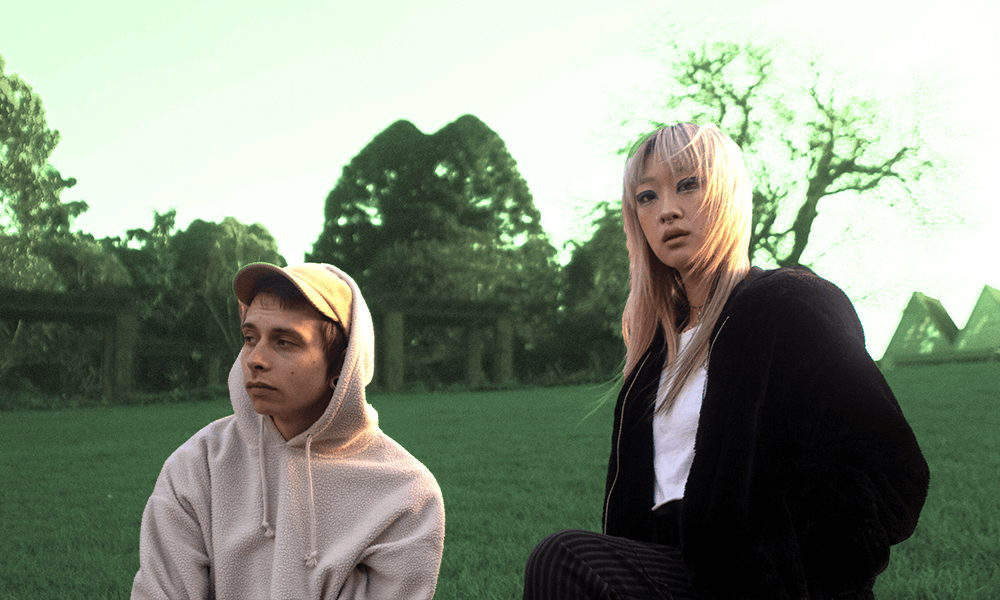After a three-year wait, Imugi 이무기 have just released their sophomore EP, Dragonfruit. Matt McAuley caught up with the Auckland band to learn what they’ve been up to since their 2017 debut.
Attending Rangitoto College on Auckland’s North Shore in the mid-2010s, Yery Cho and Carl Ruwhiu first entered each other’s orbits mostly because they’d found that they didn’t fit into anyone else’s. Marginalised by a school culture that felt overly stratified and exclusive – “You know how at high school, you’ve got different cliques? Our high school was really like that,” explains Cho – they gravitated, along with a wider cadre of “outcasts”, to seeking solace in free periods spent smoking weed, and lunchtimes spent sharing music and watching Bob Ross videos in vacant classrooms.
From there they’d have their minds expanded by Tāmaki’s at-the-time burgeoning all ages music scene – “We’d go to a Caroles show at [New Lynn record store / DIY venue] UFO and be like, ‘People in Auckland are doing this?’ recalls Ruwhiu – and go on to join bands of their own, eventually coming together as a two-piece with little in the way of expectation. Ruwhiu describes their first efforts as a band – and the enthusiastic reception those saw – as more serendipitous than anything.
“Because we were hanging out heaps anyway, I think at some point a friend suggested that we work together. So we made ‘Dizzy’ and uploaded it, and it got this random traction that we just weren’t at all expecting. So we were just like, ‘Oh, should we write another song?’”
And although that follow-up was delayed for a couple of years by Ruwhiu moving out of the city and Cho beginning studies at university, when it eventually came in the form of 2017’s Vacasian EP, the hype around the pair continued to build. Single ‘Paradise’ would become a mainstay on student radio, and the band soon found themselves touring the country, gracing festival stages and courting interest from outsiders. Having signed with Auckland outfit A Label Called Success in late 2018, the pair had initially planned for Vacasian’s follow up to arrive by mid-2019 – speaking to The Spinoff early last year, they were enthusiastic about how things were moving and for its imminent arrival.
Things would get a bit complicated from there, and at times a bit tense, but if you didn’t already know that inside detail, you probably wouldn’t pick it from their demeanour. It’s sunny, mild day in late October when we meet, just a week before the delayed and long-awaited arrival of that sophomore release, the self-assured and frankly quite gorgeous Dragonfruit EP. I’m sprawled precariously on a steeper-than-expected grass bank in Central Auckland’s Myers Park with the band’s central duo and Casey Yeoh (Ruwhiu’s partner and a frequent visual contributor for the project), the three exuding only the slightest hint of weariness as they recount what led them to this point.
“We put out [singles] ‘Greensmoke’ and ‘Be Here Soon’ with the label, but as we looked more into the contract that we’d signed with them, I guess we just saw the potential limitations,” Ruwhiu says. “It was a long contract, we were going to be working with them for a long time. [And] we didn’t have a manager – once we got one, and we went over our contract together, she kind of highlighted a bunch of things that we didn’t really understand when we signed it.”
The two parties attempted to find a compromise on the deal, but after protracted discussions Imugi and A Label Called Success would cut ties prior to Dragonfruit’s release, with Sony Music subsidiary The Orchard taking over digital distribution and promotional duties. While the experience was clearly a tiring one for the band, they’re adamant that going through it hasn’t dulled their enthusiasm for the end product.
“It’s one of those things where that music has always been ours, and we’ve been able to create a [separation] between the music side and the business side,” says Cho. “For a while we got jaded by all the industry bullshit that does go on, but I think in terms of the music itself, making the EP was such a great experience.”
Rather than a reinvention, the production process behind Dragonfruit represented something closer to a levelling-up of their earlier approach. Ruwhiu still produced the bones of the record in his bedroom studio, but rather than handling the entire process themselves, this time the two put their work into the hands of engineers and producers Ben Lawson (Red Bull Music, David Dallas) and Josh Fountain (recent AMA-winner for his work with Benee, among others). Ruwhiu, a production nerd in his own right, says that he’d long looked forward to the opportunity.
“In high school I had this obsession with Tame Impala’s second album. And I knew that [frontman and songwriter] Kevin Parker had taken that whole album to this guy Dave Fridmann to mix it. I had this shit recorded, and I knew it could sound really epic if it was mixed really well. So having the chance to work with Josh and Ben was like, fully realising the songs.”
The in-studio experience also helped the pair in ways slightly less tangible. “I think the first or second session we had with Josh, we were like, ‘Do you have any advice for us, as young people in the industry?’” Cho laughs, “And he was just like, ‘Ah, you’re going to fuck up, so prepare to be jaded.’”
As a writer who’s built their catalogue in large part around critiquing the modern world’s interconnected systems of oppression – racism, sexism and the ills of capitalism are common themes in Imugi’s output – Cho seems particularly at risk of losing motivation. It’s something they’ve had to reckon with as the band’s increased in prominence, and something which still obviously gives them pause.
“I feel a lot better about it now, because I don’t feel so much anxiety or imposter syndrome, but yeah, it takes a lot of unpacking. If you ask a lot of people what success is, they want stability, money, financial comfort, things like that. But it’s really hard to imagine that kind of life, and there’s no ethical consumption under late capitalism anyway, so get the bag and redistribute the wealth.
“A few years back, because I was younger, I felt like I had more time to invest into different things. And then as the music becomes more and more [time-consuming], you start having to drop things. And you see with all these grass roots movements, people doing all of this work and not even taking any credit for it. So it is kind of weird when we go up on stage and say, like, ‘Rich people suck!’ and have people come up to us afterwards like, ‘Wow! Preach!’ Because people have been saying this shit forever.”
But while they’re aware of the tension inherent in occupying the territory that they do, it’s clear when speaking to the band, or hearing them speak in interviews, or seeing them perform live, that the spark at their core hasn’t been diminished by the elevation of their platform. Playing bigger stages may have made “the love a bit harder to access”, as Cho says, but remaining clear-eyed about why they create has allowed them to continue to find joy in what they do.
“When you’re playing at Rhythm & Vines and it’s 4pm and there’s six people in the field, and you’re up on stage saying, like, ‘Fuck…racism’, and they’re all just staring at you? That can be kind of jarring. It can make you want to reassess your intentions and your purpose for doing this. But we just had to go back to our roots and try to really hold that close to our hearts.”
And for Ruwhiu? Although at its core the band is still just he and his high school friend making beats and writing songs in a Grey Lynn flat, the approach that Imugi have taken towards collaboration and community-building has given the project a vitality that supersedes any kind of commercial imperative. And while Ruwhiu will gladly talk at length about process and inspiration, when I ask the pair to explain how they work together and how they’ve learned to trust each other, his answer is both bigger and far more simple.
“I think Imugi has become such a big part of our lives now, and it’s so cool having all of our friends involved, that it’s just something that we both want to keep doing, to keep working at. Whenever we have creative opportunities now it’s like, ‘How can this work with Imugi?’. It gives us a reason to exist.”
This content, like Imugi’s Dragonfruit EP, was created with the support of NZ on Air.

